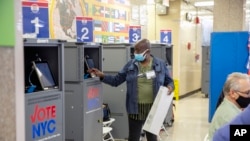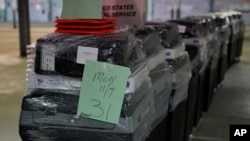Voting machine manufacturers are likely to be targeted by a new wave of disinformation intended to discredit election results as American voters head to the polls Tuesday.
U.S. officials including those at the lead agency for election security, the Cybersecurity and Infrastructure Security Agency (CISA), have been pushing back against a steady drumbeat of allegations, noting many of them echo similar, debunked allegations from the 2020 presidential election.
It is a message that has even been echoed by the White House.
“We believe that Americans can and should go to the polls feeling comfortable that that everything is being done to make sure that this is a free and fair and secure election,” John Kirby, the National Security Council’s coordinator for strategic communications, told reporters this past Friday.
But new research from the cybersecurity firm Recorded Future finds there are indications disinformation efforts surrounding voting machines and voting systems, are likely to surge on election day and the days that follow, though the efforts are unlikely to match the intensity of two years ago.
“Recorded Future has already identified claims across numerous facets of the mainstream and alternative social media landscape suggesting that technologies … will be used to ‘rig’ the results of the midterms,” the company said in a report released Monday.
“It is likely that mis- and disinformation surrounding voting technologies will be most prominent in jurisdictions that are facing particularly contentious races, such as the gubernatorial election in Arizona, the gubernatorial election in Pennsylvania, and the Senate seat race in Georgia,” the report added.
Other states likely to face intense scrutiny from disinformation campaigns targeting the reliability of voting systems include Wisconsin, Michigan, Nevada and Florida, the report said.
So far, according to Recorded Future, most of the disinformation efforts have originated in the United States, and most have targeted just three companies: Dominion Voting Systems, Smartmatic and Election Systems & Software (ES&S).
According to the nonprofit organization, Verified Voting, which promotes the use of secure election technologies, Dominion systems will be used in 21 states and 1,200 voting jurisdictions for the 2022 midterms.
ES&S is being used in 39 states and in Washington, D.C. Smartmatic is being used only in Los Angeles County in California.
All three companies have pushed back against previous allegations of wrongdoing, with Dominion going as far as to file defamation suits against Fox News, One America News Network (OAN) and Newsmax, charging them with spreading false claims by former U.S. President Donald Trump and his allies following the 2020 presidential election.
“Baseless claims about Dominion Voting Systems and the November 2020 election have been fully debunked by election authorities, subject matter experts, and third-party fact-checkers,” the company wrote on its website on a page updated Sunday.
Dominion’s efforts, however, have not stopped new disinformation campaigns from taking root.
“Recorded Future has surfaced false claims that Dominion technologies will be purposefully rigged for the 2022 midterms across most major facets of mainstream and alternative media,” the cybersecurity firm said in its report Monday, citing allegations on Facebook, Instagram, Telegram, Gab, Patriots[.]win and 4chan.
The researchers further found some allegations being promoted by two Russian-linked propaganda outlets -- Red Spring Information Agency and the Centre for Research on Globalization.
ES&S, widely used in a number of election battleground states such as Arizona, Pennsylvania and Florida, has not been subjected to the same level of scrutiny as Dominion, but has drawn the ire of “far-right and ultraconservative alternative social media platforms and ‘news’ blogs,” according to the Recorded Future report.
Despite its small footprint in the U.S., Smartmatic has garnered considerable attention.
“Recorded Future discovered multiple instances of mis- and disinformation targeting Smartmatic with corruption and rigging claims,” the report said, pointing to posts on Gab, Patriots[.]win and SouthFront, a propaganda outlet linked to Russia’s security services.
A fourth voting machine and voting systems company, Scytl, has also been subjected to rumors even though it is not being used in any U.S. jurisdiction for Tuesday’s vote, Recorded Future said.
At times, all four companies have been targeted together.
“These pieces of garbage collectively have been stealing our elections,” Joe Oltmann, conservative activist and co-host of the Conservative Daily Podcast, wrote on his Telegram channel last month. “They have recycled code, manipulated votes and destroyed our voices while stealing elections at every level.”
Recorded Future is not alone in its warnings.
The Election Integrity Partnership (EIP), which describes itself as a nonpartisan research coalition, said in a report released Saturday that online influencers pushing election fraud conspiracy theories “continue to thrive on mainstream and alternative platforms, building up sizable audiences.”
“Many use a combination of platforms, often in complementary ways,” EIP said. “Even when a specific account is not present on a particular platform, its audiences may cross-post content there from other platforms.”
For now, U.S. officials are doing what they can to draw attention from the disinformation efforts, pushing CISA’s “Rumor Control” website, as well as similar fact-checking websites run by individual states.
Cybersecurity experts from a number of high-profile private sector companies have also sought to allay concerns.
“I don't see any indications that any sort of technology is compromised, or we should lose confidence in the election system,” Pat Flynn, head of the Advanced Programs Group at Trellix, told VOA.
“There is a continued focus on state election officials,” he said, pointing to recent phishing campaigns in Arizona, Pennsylvania and elsewhere.
But Flynn said such attempts have been “pretty basic … very much focused on the user itself, phishing and trying to bait them into surrendering their credentials.”
“Predominantly the election process is secure,” he said.













